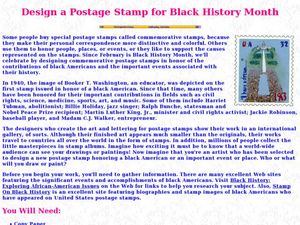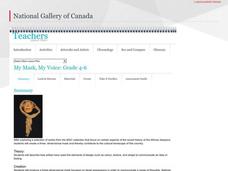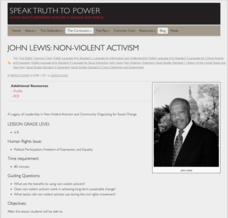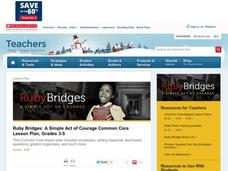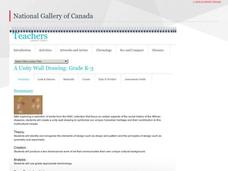Anti-Defamation League
10 Ideas for Teaching Black History Month
Celebrate Black History Month with the help of 10 ideas that delve deep into the history, major events, contributions, famous African Americans, and sheds light on how scholars today can take a proactive stance on current civil rights...
The Imagination Factory
Design a Postage Stamp for Black History Month
Learners create a postage stamp for Black History Month. For this U.S. History lesson, students discuss the contributions of African-Americans and design a postage stamp to celebrate their impact.
National Gallery of Canada
My Mask, My Voice
Recognize Black History Month with an examination of the African diaspora and a hands-on mask-making project. Learners first view and discuss images of artwork before creating their own plaster masks.
Smithsonian Institution
Art to Zoo: Life in the Promised Land: African-American Migrants in Northern Cities, 1916-1940
This is a fantastic resource designed for learners to envision what it was like for the three million African-Americans who migrated to urban industrial centers of the northern United States between 1910 and 1940. After reading a...
Country Music Hall of Fame
Ray Charles and Country Music
Ray Charles used the pain and adversity from his life to influence an entire genre of American music. Learn about the musician's daily life, struggles and success, and powerful musical style with a thorough resource.
Curated OER
Abraham Lincoln and Frederick Douglass: A Compare and Contrast Lesson Plan
Two great men, one time period, and one purpose; it sounds like a movie trailer, but it's not. It's a very good comparative analysis lesson plan focused on Abraham Lincoln and Frederick Douglass. Learners will research and read...
Speak Truth to Power
John Lewis: Non-Violent Activism
After comparing and contrasting non-violent and violent social movements, your young historians will take a closer look at the work and influence of John Lewis on the civil rights movement. They will then choose a current social justice...
John F. Kennedy Center
Musical Harlem: How Is Jazz Music Reflective of the Harlem Renaissance?
Bring jazz music and the Harlem Renaissance to light with a lesson that challenges scholars to research and create. Pupils delve deep into information materials to identify jazz terminology, compare types of jazz and jazz musicians,...
Northern Nevada Council for the Social Studies
What Are the Origins and Influences of Rap Music?
Considered an American art form, rap has its roots in places from Jamaica to the Bronx. Using a series of readings, comprehension questions, and videos, scholars explore the history of rap and its connections to the African diaspora....
John F. Kennedy Center
Harriet Tubman: An Informative and Impressionistic Look
Informational text and impressionistic art lead a lesson plan about Harriet Tubman. Working in teams, scholars examine a variety of resources. They analyze, compare, and contrast the work. Using their research findings, pupils create an...
Smithsonian Institution
Jamaican Song, Dance, and Play: Experiences with Jamaican Musical Traditions
Young musicians experience song, dance, and play of the Jamaican culture. Scholars listen for and recreate beats, they play tunes, make up original dances, and play a game that challenges pupils to pass stones to a specific beat.
Crafting Freedom
Man in the Middle: Thomas Day and the Free Black Experience
How did free and enslaved blacks work to craft freedom for themselves and their families before the Civil War? Young historians read about the life of Thomas Day, a free black man who also owned slaves and had abolitionist ties in...
Smithsonian Institution
Singing for Justice: Following the Musical Journey of “This Little Light of Mine”
Scholars go on a musical journey to discover the origin, importance, and evolution of the song, "This Little Light of Mine". Class members boost their voice talents and clap to the beat while learning the lyrics in both English and Zulu....
Scholastic
Ruby Bridges: A Simple Act of Courage, Grades K-2
A civil rights movement lesson designed specifically with the Common Core State Standards in mind, young learners are introduced to the story of Ruby Bridges as the first African American child to attend an all-white elementary school....
Scholastic
Ruby Bridges: A Simple Act of Courage, Grades 3-5
Through character trait graphic organizers, a vocabulary sorting activity, class discussion, and a civil rights movement slide show, your young historians will be introduced to the amazing story of Ruby Bridges and her experiences as the...
American Institute of Physics
African American Inventors in History
A two-part lesson introduces young historians to the work of famous African American inventors. Groups first research and develop a presentation of an inventor that includes biographical information and information about one of their...
Smithsonian Institution
Spirits Across the Ocean: Yoruban and Dahomean Cultures in the Caribbean Brought by the Slave Trade
Much of Latin American music owes its origins to the slave trade. Peoples from the Yoruban and Dahomean cultures brought with them the distinctive rhythms, time signatures, and eighth note patterns that now characterize Caribbean music....
Smithsonian Institution
African American Music: Let’s Sing and Play Clapping Games
Two lessons focus on making a beat. Using popular African American music of its time, scholars listen and analyze the rhythm then recreate it with hands drums, and cups.
National Endowment for the Humanities
Jacob Lawrence's Migration Series: Removing the Mask
Describe, analyze, compare and contrast poets from the Harlem Renaissance. Critical thinkers analyze the imagery, characterization, tone, symbolism, and historical context of Jacob Lawrence, Helene Johnson, and Paul Laurence Dunbar. A...
PBS
Explore Art and Movement Inspired by Jacob Lawrence’s Migration Series
Panel 58 from Jacob Lawrence's "Migration Series" of paintings provides middle schoolers with an opportunity to sharpen their observation and analytical skills. After engaging in a warm-up activity that introduces the concepts of...
National Gallery of Canada
A Unity Wall Drawing
Build class community with an art project. Learners first examine and discuss works of art. They then contribute to a class mural by tracing their hands and decorating them in relation to their own cultures. The final mural incorporates...
Curated OER
The Journey to Civil Rights
Students explore Civil Rights. In this Civil Rights lesson, students read about Ruby Bridges and define the words segregation and supremacy. Students make a timeline of important events in Civil Rights and write a paragraph about why the...
Crafting Freedom
Frances Ellen Watkins Harper: Lover of Literacy
This, the sixth in a series of 10 related resources, examines the life and works of Frances Ellen Watkins Harper, an African American author, born in 1825, who advocated literacy for both free and enslaved African Americans.
Crafting Freedom
George Moses Horton: Crafting Virtual Freedom Through Poetry
What is "virtual freedom"? How about "enslaved entrepreneurship"? Class members will learn about these terms and much more as they read the poems and examine the life of George Moses Horton.



